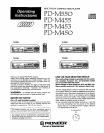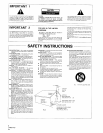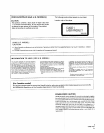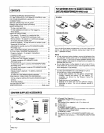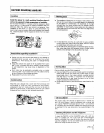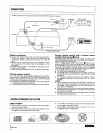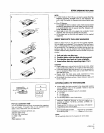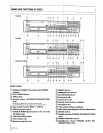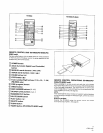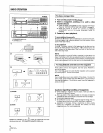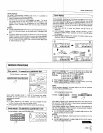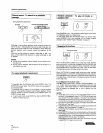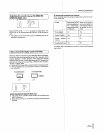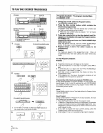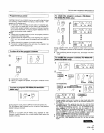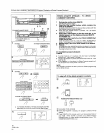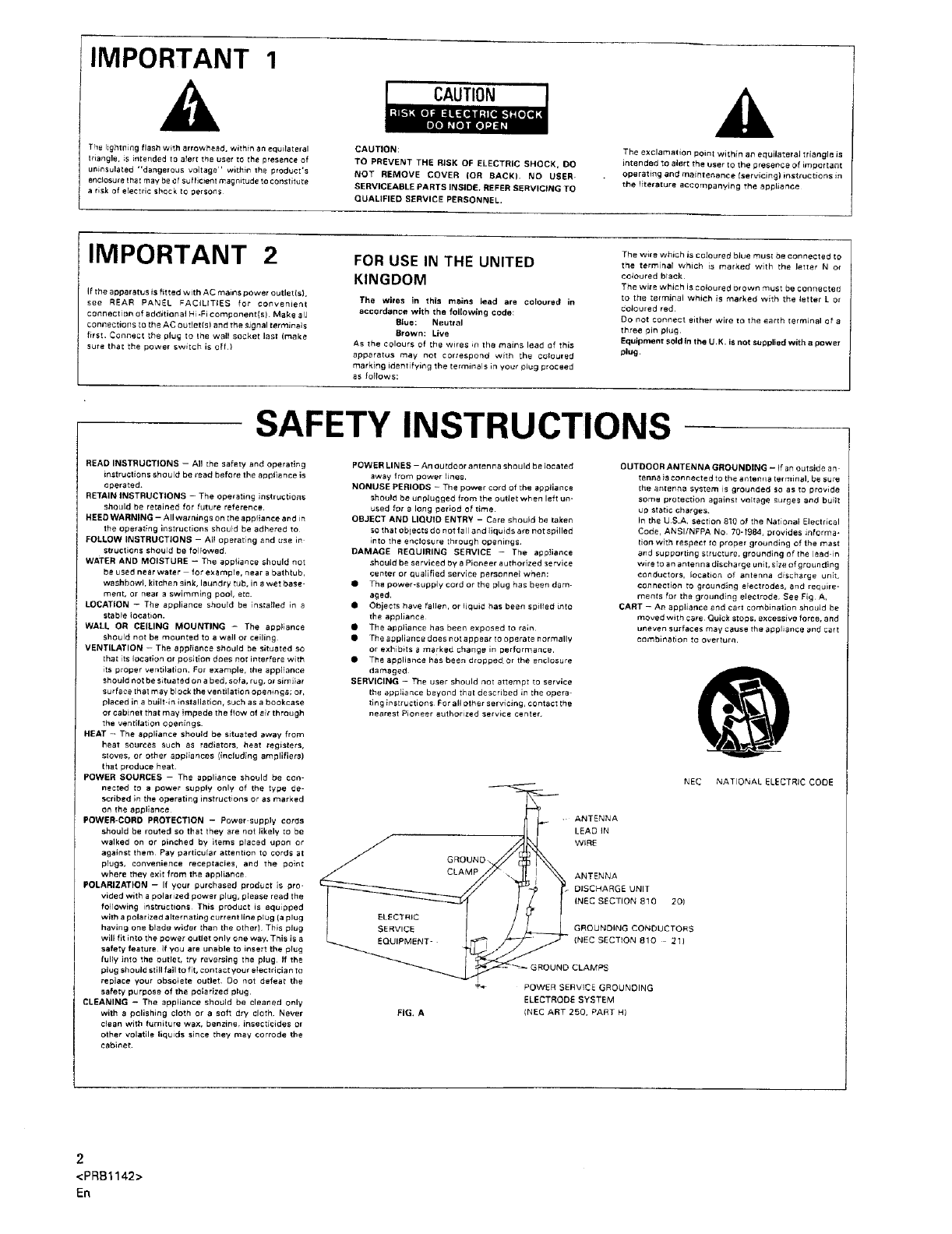
IMPORTANT 1
The lightning flash with arrowhead, withfn an equilateral
triangle, is intended to ater_ ttle user to the presence of
uninsulated "dangerous voltage" within the product's
enclosur e tha_ may be of _u fticient magnitude to constitute
a risk of electric shock to persons
CAUTION
CAUTION:
TO PREVENT THE RISK OF ELECTRIC SHOCK, DO
NOT REMOVE CDVER (DR BACK). NO USER-
SERVICEABLE PARTS INSIDE, REFER SERVICING TD
QUALIFIED SERVICE PERSONNEL.
The exclamation point within an equilateral triangle is
intended to alert the User to the presence of important
operating and mairltenan_te Iservicing) instructions in
the riterature accompanying the appliance
IMPORTANT 2
If the apparatus is fitted with AC mains power outlet(s),
see REAR PANEL FACILITIES for convenient
connection of additional Hi-Fi component(s). Make all
connections to the AC ougetls) and the signal terminals
first. Connect _he _lug to the wall socket last Imake
sure that the power switch is oft.I
FOR USE IN THE UNITED
KINGDOM
The wires in this mains lead are coloured in
accordance with the following code:
Due: Neutral
Browm Live
As the colours of the wires in tile mains lead of this
apparatus may not correspond with the coloured
marking identifying the terminals in your plog proceed
as fotIOWS:
The wire which is co,cured blue mus! he connected to
the terminal which [s marked with the letter N or
coloured black
The wire which is coloured crown must be connected
to the terminal which is marked with the letter L or
co_oured red,
DO not connect either wire to the earth terminal of a
three pin plucJ
Equipment sold in the U,K. is not supplied with a power
plug.
SAFETY INSTRUCTIONS
READ INSTRUCTIONS - Ag the safety and operating
instructions should be read before the appliance is
Qperated,
RETAIN INSTRUCTIONS -- The operating instructions
should be reIained for future reference.
HEED WARNING - All warnings on the appgance and in
the operating instructions should be adhered to
FOLLOW INSTRUCTIONS - All operating and use in
structions should be followed,
WATER AND MOISTURE -- The appliance should not
be used near water for example, near a bathtub,
washbowl, kitchen sink, laundry tub, in a wet base-
ment, or near a swirnmlng pool, etc.
LOCATION - The appliance should be installed in a
stable location.
WALL OR CEILING MOUNTING - The appfiance
should not be mounted to a waft or ceiling
VENTILATION - The appliance should be situated SO
that its location or position does not interfere with
its proper ventgatlon. For example, the appliance
should not be situated on a bed, sofa, ru g, or simiiar
surface that may block the ventilation openmgs; or.
placed in a built in installation, such as a bookcase
or cabinet that may impede the flow of air through
the ventilation openings.
HEAT -- The appliance should be situated away from
heat sources such as radiators, heat registers,
stoves, or other abptiances [including amplifiers)
that produce heat.
POWER SOURCES - The appliance should be con-
nected to a power supply only of the type go-
scribed in the operating instructions or as marked
en the appliance
POWER-CORD PROTECTION - Power supply cords
should be routed so that they are not likely [o be
walked on or pinched by items placed upon or
against them Pay particular attention to cords at
plugs, convenience receptacles, and the point
where they exit from the appliance
POLARIZATION - If your purchased product is pro _
vided with a polarized power plug, please read the
following instructions This product is equipped
with a polarized alternating current line plug (a plug
having one blade wider than the other) This plug
will fit into the power outlet only one way. This is a
safety feature if you are unable to insert the plug
fully into the outlet, try reversing the plug If the
plug shoulP still fall to fit, contact your electrician to
replace your obs(;lete outlet, Do not defeat the
safety purpose of the polarized plug
CLEANING - The appliance should be cleaned only
with a polishing cloth or a soft dry cloth. Never
dean with furniture wax, benzine, insecticides or
other volatile liquids since they may corrode the
cabinet
POWER LINES - An ou [door antenna should be located
away from power lines,
NONUSE PERIODS - The power cord of the appliance
should be unplugged from the outlet when left un-
used for a long period of time
OBJECT AND LIQUID ENTRY - Care should be taken
so that obiects do not fall and liquids are not spilled
into the enclosure through openings
DAMAGE REQUIRING SERVICE - The appliance
should he se rviced by a Pioneer a uthorized service
center or quafified service personnel when:
• The power-supply cord or the plug has been dam-
aged.
• Objects have fallen, or fiquid has been spiged Lnto
(he appliance
• The appliance has been exposed to rain
• [heappliancedoesnotappeattooperatenormally
or exhibits a marked change in performance.
• The appliance has been d_oppe_ or the enclosure
damaged
SERVICING - The user should not attempt to service
the appliance beyond that described in [he opera-
ting instructions For all other servicing, conta¢I Ihe
nearest Pioneer authorized service center.
OUTDDDRANTENNA GROUNDING - if an outside an
tenna is connected to the antenna ter rT=inal, be sure
the antenna system is grounded so as to provide
some protection against voltage surges and built
up static charges.
In the US.A, section 810 of the National Electrical
Code, ANSI/NFPA No 70-1984, provides informa-
tion with respect to proper grounding of the mast
and supporting structure, grounding of the lead-in
wire to an antenna discharge unit, size of grounding
conductors, location of antenna discharge unk,
conneetlon tO grounding electrodes, and require-
ments for the grounding electrode See Fig A,
CART - An appfiance and cart combination should he
moved with care Quick stops, excessive force, and
uneven surfaces may cause the appfiance and cart
combination to overturn.
NEC NATIONAL ELECTRIC CODE
_" GROUND_
CLAMP
FIG. A
. ANTENNA
LEAD IN
WIRE
ANTENNA
DISCHARGE UNIT
INEC SECTION 810 20)
GROUNDING CONDUCTORS
810 - 211
S
POWER SERVICE GROUNDING
ELECTRODE SYSTEM
(NEC ART 250, PART HI
2
<PRB1142>
En



